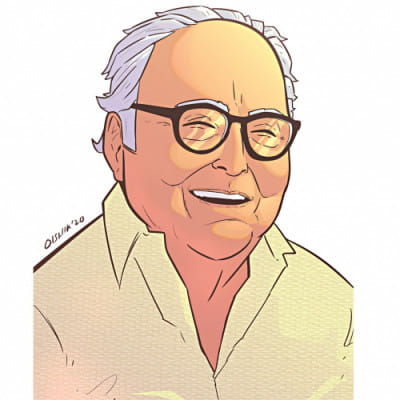Growing up with Apu, Feluda and many others

From the young detective Feluda to Bishwanath Majumdar in "Bela Seshe" we all fell in love with Soumitra Chatterjee's bewildering charm and talent, at some point in our lives. Brimming with intensity and brilliance, his sharp gaze keeps us hooked to his characters. In "Apur Sansar" (1959), while sharing his idea of writing an autobiography, his eyes light up, his voice shakes with emotions and every one of us can relate with Apu's dreams. It is impossible to ignore his intense eyes and charm while watching his films.
The starting of Soumitra Chatterjee's acting career in cinema revolves around an interesting story involving legendary director Satyajit Ray. Ray's debut film, "Pather Panchali" came out when Soumitra Chatterjee was just a college kid. He was introduced to Ray by a friend, and he was hoping to play the lead role in "Aparajito", the second film in the Apu trilogy.
The director refused to cast Soumitra Chatterjee, as he was too tall and 'grown-up' for the part. Ray actually had no further plans to continue Apu's story after "Aparajito," but later, he decided that 24-year old Soumitra Chatterjee was perfect for the lead role in "Apur Sansar," the final film in the Apu trilogy.
The iconic director-actor duo of Satyajit Ray and Soumitra Chatterjee continued with another thirteen films throughout their careers. Soumitra Chatterjee considered it as the biggest achievement of his life.
"Our outlook and philosophy towards life, our likes and dislikes, looking at life from a certain standpoint, were common," shared Soumitra Chatterjee about Ray in an interview with journalist Shamik Bag in 2016. "There must have been a spiritual connection," the actor added, as many considered him to be Ray's alter ego.
As the audience, we fell in love with Apu's simplistic charm in "Apur Sansar," we were attracted to Sandip's revolutionary characteristics in "Ghare Baire" (1985) and we shared Amal's perplexing dilemma in "Charulata," (1964). Soumitra Chatterjee also worked with Ray in classics such as "Hirak Rajar Deshe", "Ashani Sanket", "Devi'", "Abhijan", "Aranyer Din Ratri" and "Ganashatru" among others.
Apart from Ray, he worked with other legendary filmmakers such as Mrinal Sen, Tarun Majumdar and Tapan Sinha on several films. Tapan Sinha's "Kshudhita Pashan" (1960), Asit Sen's "Swayambara" (1961), and Mrinal Sen's "Punascha" (1961), among others, are notable mentions. In the 1980s and 1990s, he started working with contemporary directors Goutam Ghose, Aparna Sen, Anjan Das and Rituparno Ghosh, among others.
As Mayur-Vahan, the swashbuckling horse-riding villain in Tapan Sinha's "Jhinder Bandi" (1961), alongside legendary actor Uttam Kumar, Soumitra Chatterjee proved his versatility as an artiste.
At a time when Uttam Kumar and his roles as the romantic hero captivated the audience, Soumitra Chatterjee's emergence as an actor changed the mainstream idea of a protagonist. We could relate to his portrayals of an ordinary man; he was not necessarily the 'hero' or the 'lover.' We see a reflection of ourselves in the characters Soumitra masterfully portrayed onto the screen.
Listening to Kishore Kumar's Rabindra Sangeet "Ami Chini Go Chini Tomare", Manna Dey's "Hoytoh Tomari Jonnyo", and "Jibone Ki Pabona," among other timeless classics picturised on Soumitra Chatterjee's characters, is always a delightful experience for the fans.
He started his career on the stage, and considered thespian Sisir Bhaduri as his mentor. He went on to become an icon in the theatre arena. Apart from acting, Soumitra Chatterjee was also known for his exceptional talents as a playwright, poet, painter and theatre director.
"Dori Dhore Maro Taan, Raja Hobe Khan Khan", Soumitra Chatterjee's iconic line from Ray's "Hirak Rajar Deshe", is still relevant today, and used by revolutionists from all walks of life.
Soumitra Chatterjee's powerful voice also earned him the title of one of the most prominent elocutionists in Bengal. His strong command and his undeniable love for Bengali literature and language, made him decline several offers in Hindi films. He devoted himself to films in Kolkata, wholeheartedly.
"The end is inevitable and it is useless to be afraid of it," shared the cancer survivor, in an interview with Amit Roy in 2009 in London. "My time has become shorter now, I can almost see the end. I am not afraid of dying."
Although we mourn Soumitra Chatterjee's passing with heavy hearts, he will live among us through the beloved Apu, Feluda and Bishwanath Majumdar, among countless other mesmerising characters.
Rasheek Tabassum Mondira is an authentic night-owl and an actual zombie throughout the day. She loves binge-watching, reading and writing. If you want to chat about anything and everything in life, mail her at [email protected].

 For all latest news, follow The Daily Star's Google News channel.
For all latest news, follow The Daily Star's Google News channel. 



Comments